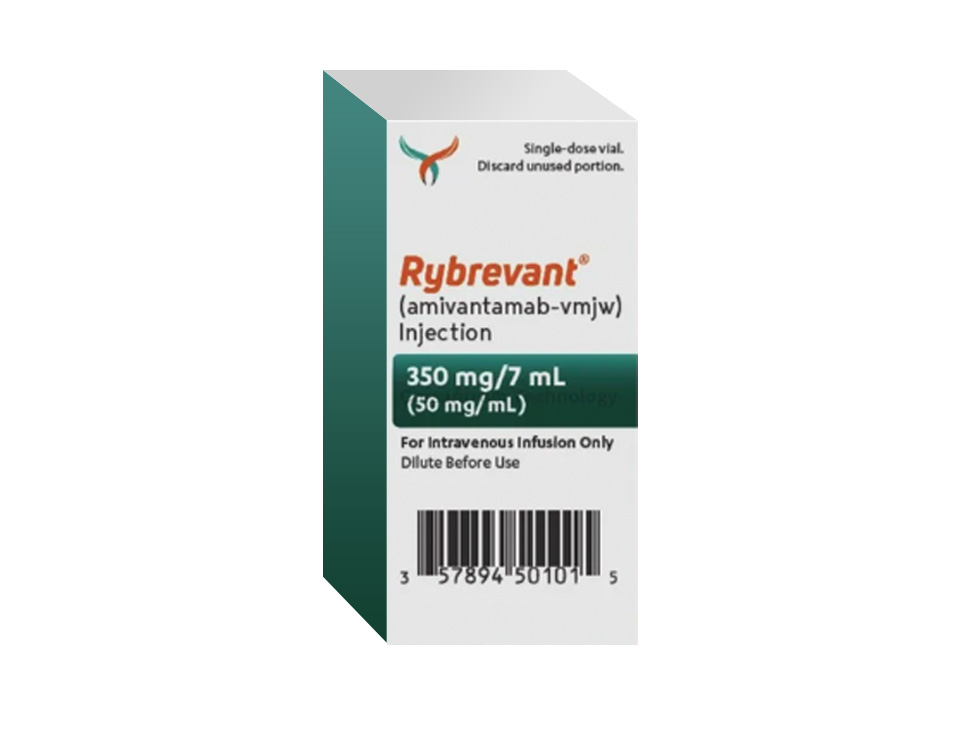Rybrevant is manufactured in Belgium and shipped by courier from our pharmacy in India.
Information about Rybrevant (Amivantamab)
Rybrevant (amivantamab) is a monoclonal antibody used in the treatment of non-small cell lung cancer (NSCLC). It is a targeted therapy that works by binding to two key receptors, EGFR (epidermal growth factor receptor) and MET (mesenchymal-epithelial transition factor), which are involved in the growth and spread of cancer cells. By blocking these receptors, amivantamab helps inhibit the signals that drive the growth of tumor cells in certain cancers. It is primarily used for the treatment of NSCLC with specific mutations, such as EGFR exon 20 insertion mutations.
Product Highlights
- Rybrevant is indicated for the treatment of advanced or metastatic NSCLC in adults who have specific mutations in the EGFR exon 20 insertion.
- It is used in patients who have not responded to other EGFR-targeted therapies.
Key Ingredient
Key Benefits
- Amivantamab specifically targets EGFR and MET receptors, which are involved in the growth of cancer cells, offering a more precise approach to treating NSCLC.
- Rybrevant is specifically effective for patients with EGFR exon 20 insertion mutations, a rare and difficult-to-treat form of NSCLC.
- In clinical trials, Rybrevant has demonstrated the ability to shrink tumors and improve progression-free survival in patients with advanced or metastatic NSCLC.
- It may be used alongside other therapies or as a stand-alone treatment in certain patients, depending on the stage and nature of the disease.
Direction of Use
- The prescribed dosage of Rybrevant is administered through an intravenous infusion. The initial dose is typically 1050 mg for the first infusion, followed by a lower maintenance dose after the first cycle (e.g., 1400 mg every two weeks).
- It is administered through an IV in a healthcare setting, with the first infusion typically being given over a period of about 2 hours, followed by a shorter time for subsequent infusions, depending on how well the patient tolerates the drug.
- During the infusion, patients should be closely monitored for any infusion-related reactions. Subsequent doses may be adjusted based on the patient's response to treatment.
Safety Concerns
- One of the most common side effects is infusion-related reactions, including fever, chills, difficulty breathing, or low blood pressure. These reactions may happen during or shortly following the infusion.
- There is a risk of developing ILD, a serious condition where the lungs become inflamed and scarred, which can lead to difficulty breathing and even respiratory failure. Patients should be closely observed for any signs of lung issues.
- Skin rashes or other skin reactions are common side effects of Rybrevant. Severe skin reactions may require dose adjustments or discontinuation of the drug.
- Some patients may experience gastrointestinal side effects like diarrhea, which should be managed appropriately.
- As Rybrevant is an immunotherapy, it can lower the body’s ability to fight infections, so patients should be monitored for any signs of infection during treatment.
Avoid Rybrevant (Amivantamab) If
- If you have had a previous severe allergic reaction (hypersensitivity) to amivantamab or any of its ingredients, you should avoid using Rybrevant.
- Patients with a history of or active interstitial lung disease (ILD) should avoid Rybrevant, as it may worsen lung conditions.
- If you have experienced severe infusion-related reactions during previous treatments, Rybrevant may not be suitable for you, or dose adjustments may be necessary.
- Rybrevant should be avoided during pregnancy unless the potential benefits outweigh the possible risks to the fetus. It is not known if amivantamab passes into breast milk, so breastfeeding should be avoided during treatment.
This product requires special packaging to maintain its integrity during the shipping process. DO NOT USE THIS MEDICATION if the attached temperature indicator shows that the medication was exposed to temperatures below 2 degrees or above 8 degrees Celsius, and contact the pharmacy immediately.





